In Australia, Russians and Ukrainians unite against Putin’s war
In cities across Australia, protesters have rallied against the war in Ukraine.
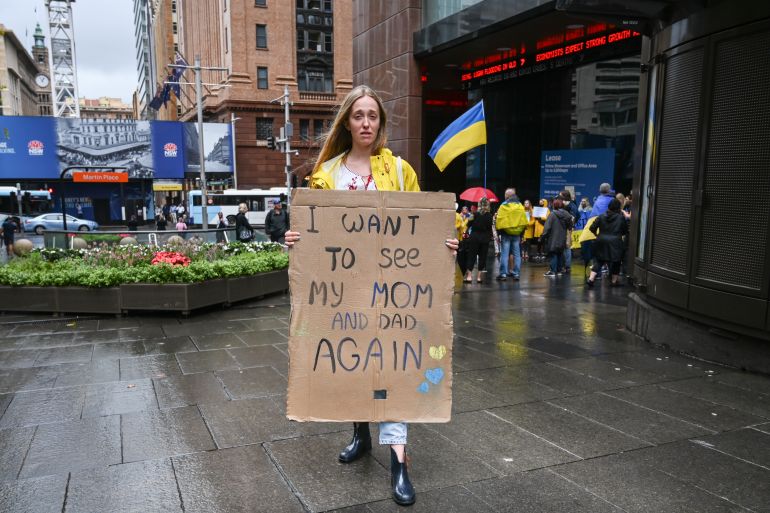
“[Ukraine] is our country,” says Anton Bogdanovych, his voice deep, his words measured. “It’s a country we love and we have nowhere to go.”
The senior lecturer from Sydney is among some 38,000 people of Ukrainian descent living in Australia.
Keep reading
list of 4 itemsRussia-Ukraine war: List of key events, day 795
Ukraine’s military chief warns of deteriorating situation on frontline
Two Russian journalists arrested over alleged work for Navalny group
Ukrainians began coming to the country in significant numbers after World War II, then when Ukraine gained independence from the Soviet Union in 1991, migration began again.
Over the years, they have built a strong community within Australian society, with close ties to family and friends back home.
Since the start of Russia’s invasion of Ukraine last month, members of this community – as well as some members of Australia’s Russian community – have been doing what they can to oppose the war from afar.
Each day, Anton brings together a growing crowd of protesters to rally against the conflict in Sydney’s Central Business District (CBD). Meanwhile other protests are taking place all over the country, some led by Russians who oppose Vladimir Putin’s invasion.
Al Jazeera spoke to six protesters about their experiences of the war; about their families back home; their fears for both countries; and their messages to the world.
Anton: ‘Our parents are terrorised, our cities destroyed’
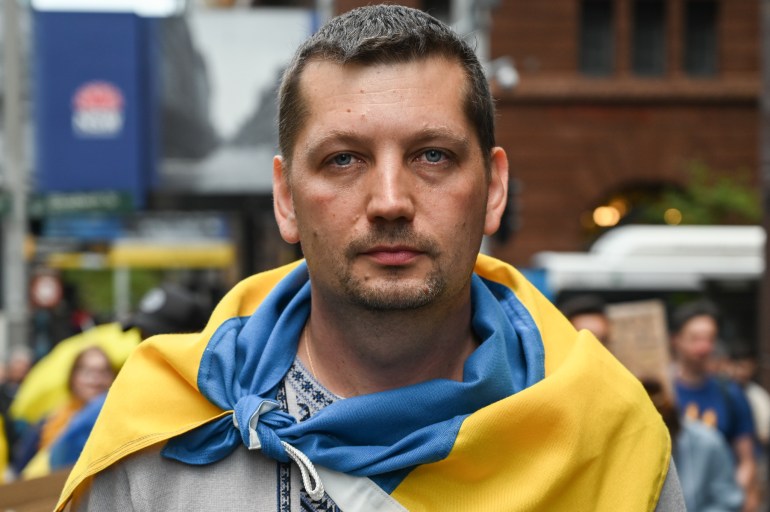
On the first day of the war, Anton Bogdanovych held a rally in Sydney. Every day since he has held one in the same city centre location and every day the number of people attending has grown. There are now more than 100 on weekdays and thousands on weekends.
The protests are for networking, for “organising, deciding what to do, allocating people to different directions,” but also for lifting one another’s spirits, Anton says.
“It’s just very difficult psychologically for people to … wake up every morning checking whether their parents are alive or not … you don’t want to call them and wake them up, so you send a message hoping for the best and it can take a long time until they reply.
“For some cities where there is no electricity any more, or internet connection, it’s even worse.”
Anton’s entire family is still in Ukraine, and most of them cannot evacuate.
“My grandma is 94, she has dementia, she has a broken leg, she can’t be transported. So my mum decided to stay at home with her. She is in Kyiv,” he explains.
“My mum needs hip replacement surgery. So her leg really hurts. And of course, no surgeries are possible right now.”
Many people in Ukraine are chronically sleep-deprived now, Anton says. His family can only sleep a few hours every night because of the bombing.
“Sleep deprivation is a form of torture … It affects their health. My father had a heart attack because of COVID, and his heart is not fully recovered. So being sleep deprived, and there are all these loud bangs all the time, I’m quite worried for his heart.”
He is also afraid for the future of the country.
“We fought really hard with Ukrainian lives for our freedom…” he says. “We see what Russians have. Where they are afraid to go on the streets even though they think that this war is unjustified. We don’t want to live in a country like that.”
Helpless as missiles “fly on the heads of our parents, and our loved ones”, Anton and the Sydney protesters are asking for a no-fly-zone above Ukraine, enforced by the rest of the world.
“Our parents are terrorised. Our cities are destroyed. For this to stop, we need help with closing down the sky so that the bombs are not dropping and missiles are not destroying our cities.”
Marta: ‘There’s no regard for ordinary civilians’
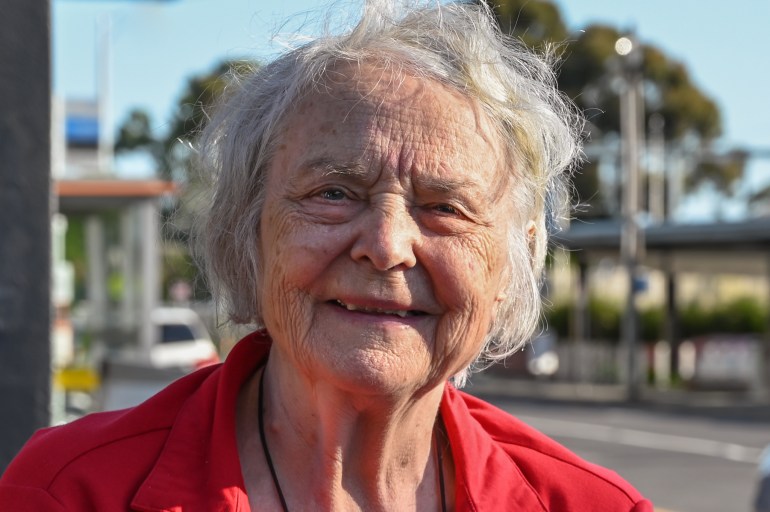
The last time Marta Semkiw heard from her family in Ukraine, the bombings were just 100km (62 miles) from their home.
Now almost 79, Marta left western Ukraine when she was six months old and her parents fled the communist regime after World War II. She was raised in Australia, witnessing the Soviet era from afar.
“My parents were political activists and [under] every occupational force that occupied Ukraine, in between the First World War and the Second World War, and afterwards, they were imprisoned,” she says.
“Between the First World War and the Second World War, western Ukraine belonged to Poland [and my parents] were both in a Polish prison. Then when the war broke out, we had the first invasion of Russians, and of course [my parents] were imprisoned [again].
“Somebody pointed a finger at [my father] and said ‘yes, he was in [prison] before’, so my father says somebody led them to my house and he was imprisoned by the Russians.
“My mother, because her mother was a widow, she wasn’t in prison. She had to go and report [to the authorities] every day.”
Marta did not have contact with her family back in Ukraine at all growing up.
“My dad deliberately severed contact because he [couldn’t] help them, or might harm them because he’s an ex-political activist,” she explains.
“When we finally met, they [said it’s] just as well you didn’t write … because your brother had to report every day and they kept asking ‘where’s your younger brother?’… And of course, he had no idea where [we were]. His wife just had this intuition that we were alive somewhere.
“It took 50 years before we found each other.”
Marta says Putin’s war reminds her a lot of what her parents told her about previous occupations of Ukraine: “About the oppression, about the cruelty, about the loss of freedom, [being] unable to speak what you wanted to speak.”
“Now you’ve got that plus all the new weapons that people are using, and I mean, there’s no such thing as any regard for ordinary civilians, they are bombed daily.
“It’s breaking up families,” Marta says. “They don’t know whether they’ll see each other again, you’ve got fathers saying goodbye to their wives and children, and going back to the front.
“[I feel] stressed, worried, powerless … emotional, but I ring my cousin every day to try and bolster her … when she gets down in the dumps I say something positive.”
Iryna: ‘It’s hell in Kyiv’
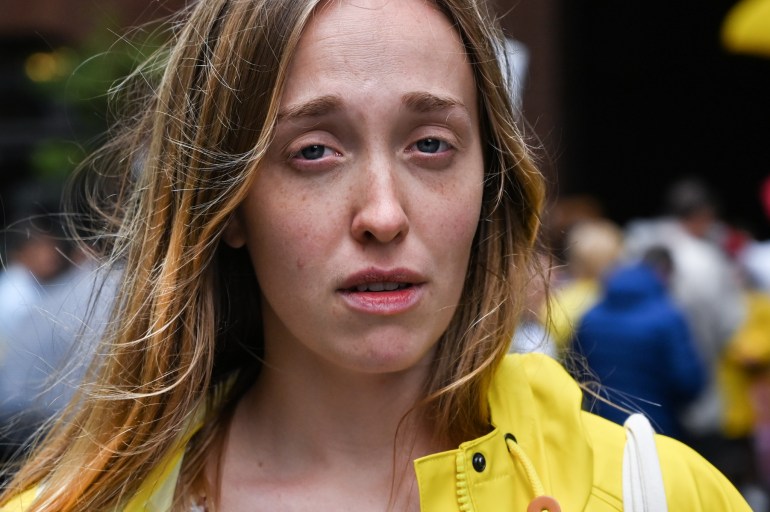
Iryna Semenova is desperately worried for her parents. Born and raised in the Ukrainian capital, Kyiv, she moved to Australia three years ago with her partner for work after spending time in Germany and Canada.
At Anton’s protest in Sydney, she stands holding a sign reading “I want to see my mom and dad again”.
Iryna’s parents were in Kyiv when the war began.
“I see a lot of people telling me, why didn’t you get them out of [the] country before?
“It wasn’t that easy. No one wanted to believe that [the war was] going to happen and my parents especially – for the first days of war, they were just hoping that [everything] will go away.”
But recently both Iryna’s and her partner’s parents have left the city. “We were monitoring what’s going on for them, helping other people on the road – that’s another example [of] how people are united,” she says.
“[My parents] are not in a safe place still, but at least it’s quieter because Kyiv … it’s just hell in there.”
Iryna was also able to leave her savings with her parents so that they at least have some money. But a bigger problem now is getting food and medicine, she says.
“My dad has issues with diabetes … I’m really worried for [my parents] to find enough petrol to drive, to find medicine, to survive, to find food and water.
“They left their homes and everything that they had in there. They just [took] some warm clothes and money and the food that they had left, and that’s what everyone is doing now. Hoping and praying that they will be able to get back to their home once again, that they … will survive.”
Another worry, she says, is that her dad will not be able to leave Ukraine – “every father … almost every grandfather” has to stay behind to fight. “He [is so sick] … I really hate to think that he and my mum will be separated.”
Iryna’s hope is that the Russian military will stop the invasion. “Russian mother just stop allowing your kids to come there, military workers you will die there, this is bad for you too,” she says.
For Iryna, the only way out of the war would be for the Russian people to stand up to Putin.
It was painful, she says, “to see when [Russian] people understand what’s going on, but they still say ‘there is nothing I can do, it’s the government, why do you bully us?’”
“We [Ukrainians] don’t try to bully you. We try to beg you for help.
“We are not against you, of course, we are very angry and hurt … But we understand that we are in this together. This is war. This is not some small conflict. Both sides are affected.”
Petr: ‘Russians should protest in bigger numbers’
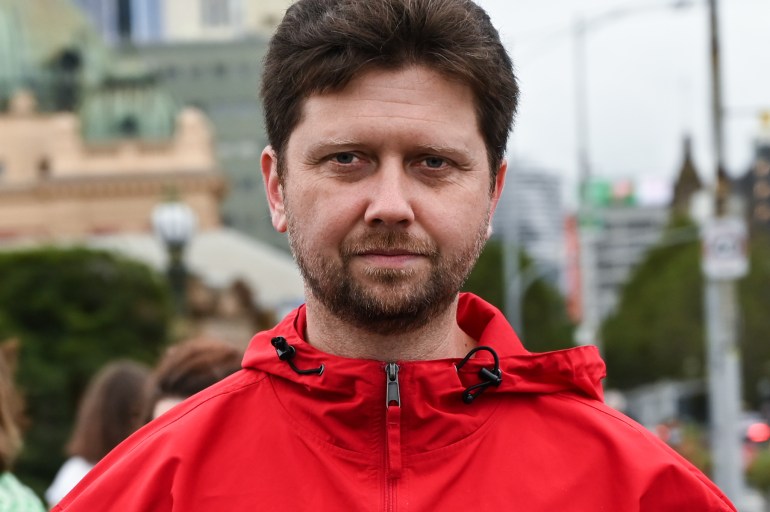
In Australia, there are also Russians making a stand against Putin’s war.
Petr Kuzmin is a Russian-Australian startup founder living in Melbourne and president of the Victoria branch of the pro-democracy movement the Svoboda Alliance.
Anton knew about Petr from afar – after Petr spoke in front of the crowd at two Ukrainian rallies in Melbourne and news of his anti-war stance spread to Sydney.
So early on in the invasion, Anton called him, asking Petr to organise protests for Russians who opposed the conflict.
Petr’s immediate reaction to Russia invading Ukraine was “visceral”.
“It’s like attacking your own brother … I felt really angry, and really pained and outraged,” he says.
He was driven to act, to do what he could “to stop the war right now. So that innocent people will stop dying, soldiers [will] stop dying”.
So he agreed to organise the Russian protests and set up the first one on March 2, the 7th day of the war.
“I was not fully confident that it would work,” he says, “but I just went ahead and set up an invite on short notice – it was only two days out – and over 50 people showed up.”
Since then, members of Melbourne’s Russian community have gathered on Princes Bridge in the centre of the city every evening, with banners to show their support for the country Putin is attacking.
But as the days pass, Petr has begun to worry for Russia too.
“I am a patriotic Russian and I find it impossible to simply cheer for the destruction of Russia in this war,” he says.
“I don’t think this is really a good outcome for the world, either. If Putin’s regime collapses in a very ugly way, and there’s lots of violence, and there’s lots of unrest … who needs a failed state one-sixth [of] the size of the world, nobody needs that.
“The sanctions are very, very rapidly destroying the banking system, the economy, and just the lives of ordinary people,” he says.
Russians around the world should be protesting “in bigger and bigger numbers” because those within Russia are not able to do so safely, he says, adding that many of his friends inside Russia are worried that if they protest, it will affect their families.
If the diaspora protests, it “will indicate to the Western world … that Russians are actually against the war, that will help fight the propaganda that the Kremlin is spewing, it will also help the Western political leaders differentiate between the regime, Putin’s regime, and ordinary people”.
“I believe there have to be two different strategies: one for the regime, and [that] has to be very punitive, and very harsh, and one for the ordinary people … people who are suffering,” he says.
The effect of the sanctions is being felt beyond Russia’s borders as well, Petr adds. One young woman who attends his protests left Russia for Australia just more than a week ago.
“Before she came to Australia, she was protesting in Moscow and she was being chased down by police … She managed to escape, she got here, and now her credit cards are not working. So she is stuck here. She doesn’t have money … She’s kind of at the mercy … of people who will help her.”
Ilya: ‘Russia cannot put the whole nation in jail’
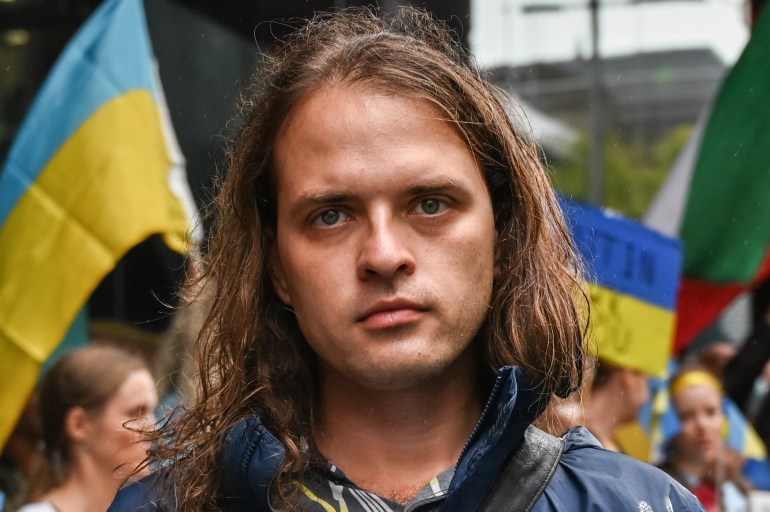
Ilya Fomin is another Russian living in Australia. He regularly attends Anton’s anti-war rallies with a Russian flag that reads: “I am Russian, and I #StandWithUkraine.”
But he opposed his government well before this latest conflict.
“I got interested in politics … when I was 18 years old,” he says.
When, in 2011, then-President Dmitry Medvedev declared Putin his successor, Ilya was outraged. “This was the moment when I understood that no … in a democratic country there cannot be any successor of [a] president.
“We started going [out to protest] every day, every night,” says Ilya.
“We were not … radicals who want[ed] just to make a riot … we want[ed] to insist on our right for a peaceful protest.”
But Ilya was arrested for protesting.
Putin was elected in March 2012 and the rallies ended with violent crackdowns. The following year, Ilya applied for a new passport.
“That was the moment when I got a pretty bad conversation with Secret Service,” he says. “They said that either you go to jail or you basically stay silent.
“I realised there is still no ‘critical mass’ to start a large democratic shift in the society and I thought I can be more useful from abroad.”
Now, Ilya is based in Australia. But back home, his friends in Russia are protesting again, this time against Putin’s attack on Ukraine. He says some of them have been arrested and spent several days in jail.
“[But] they cannot put the whole nation in a jail … so in that sense … if people would just keep going out … of course, they can just reach the moment when the state cannot actually resist.”
Ilya is part of the same organisation as Petr, the Svoboda Alliance.
“We really want Russia to stop the war, we really want foreign governments to freeze and seize [the] assets of Putin, [and the] allies of Putin,” he says. He adds that he would like this money to be given to Ukraine so it can be used to rebuild the country.
Meanwhile, living in Australia is becoming ever more difficult for Russians who, he says, are facing xenophobia because of the actions of their government.
“Just yesterday, there was a guy who attended our rally in front of the consulate … to demand the stop of the war. [He told me] he was refused to get a coffee from [a] café because of his Russian accent.”
Kateryna: ‘I am so scared’
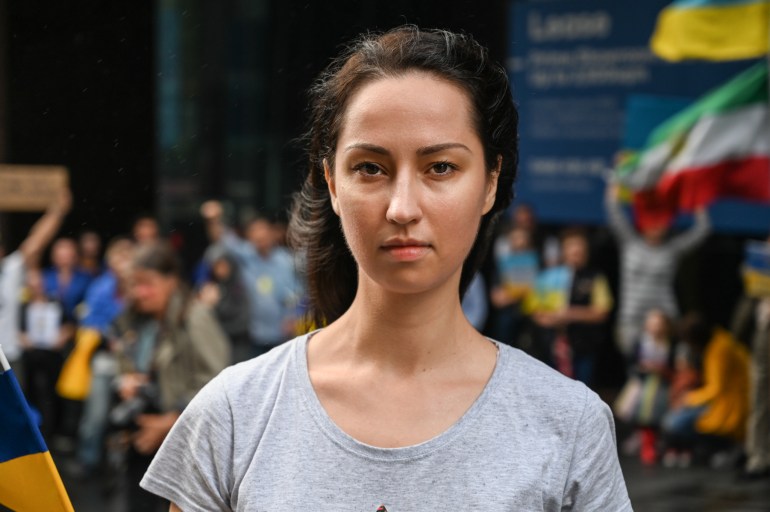
Kateryna Argyrou is co-chair of the Australian Federation of Ukrainian Organisations, a body for 22 community organisations across Australia. She has been “approaching the Australian government, asking them for help and aid”.
“The Australian government has been fantastic in responding quickly and acting quickly,” she says.
Kateryna was born in a town of 9,000 people just outside Lviv, close to the Polish border. She studied abroad, met her Australian husband in London and moved to Australia 10 years ago.
“I have a little girl now, a two-year-old,” she says.
Kateryna is the only one in her family to have left Ukraine. Her relatives live in Kyiv and Lviv.
“I don’t know if I’m going to see my mum or dad again. I don’t know if I’m going to see my sisters. I have a little girl that hasn’t seen any of my family members … a little girl that hasn’t met her grandfather.
“The day that bombs started hitting Ukraine, it was 5am in Ukraine,” she recounts, adding that it was afternoon in Sydney, where she was working from home.
“I tried to get in touch with my parents. My mom was obviously still asleep. I couldn’t get a hold of her. And I just feared the worst.
“Every single day since then, I try to call my relatives and all my family members every hour on the hour, trying to see if they’re OK, do they have everything that they need, and every time that someone doesn’t pick up the phone … I fear … that they might be dead.”
Kateryna says her grandparents live in a residential tower in Kyiv and have been “going up and down” between the basement and their flat with every air raid warning. “It’s an old building. There are leaky pipes, there’s no lighting there. There’s no running water.”
In Ukraine, the tap water is not safe to drink and people usually buy it in bottles, she says. “[Now] they can either get water and boil it but again, you need access to electricity … otherwise they have to go without water.
“Most of the shops are closed because they’ve run out of food. They’ve run out of water. And logistically, it’s very difficult to replenish that because the entire city is being bombed.”
She says many of her cousins and uncles are taking up arms “to protect their families, to fight for their freedom, fight for their land”.
“These are people that have never held a gun or even seen a gun in their life.
“It’s very difficult for them morally and psychologically because they know that … there might come a moment where they have to kill someone.”
Kateryna says she is trying to send money home to whoever needs it and is supporting people with visa applications. She plays a key role in the Sydney rallies, doing her best to “instil some sort of hope and positivity in the people that are here”.
“On the one hand, I’m trying to remain positive and motivated and keep my spirits up,” she says. “But on the other hand, I am so scared. I’m worried about every single one of my family members.”
Like others in her community, she is doing everything she can. But as Russia’s war has intensified, for many in the diaspora, words and protests are their only weapons.